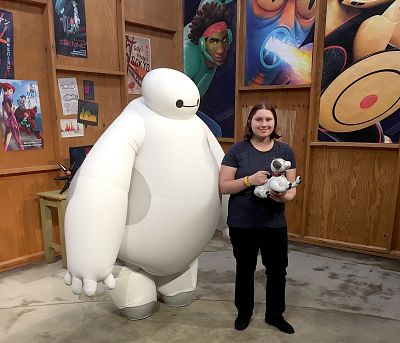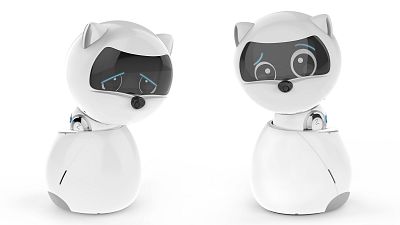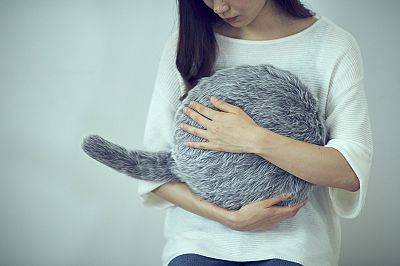With those big eyes and rounded bodies, who could resist them?
Pets may be banned from many stores, restaurants and other establishments, but Wren isn't a typical pet. It's a life-size robotic puppy that can recognize faces, learn tricks and navigate around obstacles — and it goes just about everywhere with its owner, Gillian Burns.
Burns, 21, a psychology major at Yale, says her high-tech companion — the latest version of the Aibo robotic puppySony introduced in 1999 — has "done so much to enrich my life." She credits it and the other Aibos she's owned — she got her first robotic dog at the age of 10 — with helping her cope with life's challenges.
"I am overall pretty shy," she says. "Aibos have helped me be more confident about going out of the house and interacting with other people because they give me something to talk about."
In her tender devotion to robotic pets, Burns may be an outlier — for now. Along with Sony, a handful of electronics companies are betting big on personal robots designed not to do any useful labor but simply to make us love them.
While plush robots like Paro the seal have been available for years as companions for elderly people and those with dementia, robot makers are now targeting a broader audience with offerings like the rebooted Aibo and Lovot, a backpack-sized robot with stubby arms that made its debut in December. As Groove X, the Tokyo-based maker of the latter robot, says on its website, "Lovot was born for just one reason — to be loved by you."
But will a large swatch of consumers really be interested in robots that can't take out the trash or report the weather? The bots' steep cost may be an obstacle: Aibo retails for close to $2,900, and Lovot will set you back a not-so-lovely 299,800 yen (about $2,800 at the current exchange rate).
Then again, experts say the robots could catch on because they tap into a fundamental human need: the urge to love and care for others.
"There's probably an inexhaustible demand for anything that people feel enhances social intimacy," says Gail Melson, a researcher at Purdue University who studies children's interactions with animals and robots. "The most significant need that humans have — more significant than food and water — is the intimacy of other human beings," she adds. "We can always respond more to another cute, cuddly thing."
Earning our affection
There's nothing new about humans bonding with inanimate objects, of course. Many people have deep affection for their cars and boats. Others are devoted to plush animals, family heirlooms and other sentimental items — even to their tools.
Technology
"There are cases where people have actually reported feeling sad or depressed when Roomba stops working," says Aditya Kaul, a London-based expert on robots and artificial intelligence with Tractica, a market research firm headquartered in Boulder, Colorado. "They already form emotional bonds even with very animatronic machines which are not meant to be human-like."
If we can relate to Roombas, experts say, we may be even more vulnerable to the charms of robots designed expressly to be cute and cuddly. One way these robots tug on our heartstrings is by sporting the same sorts of anatomical features seen in babies and flesh-and-blood pets, such as big eyes and rounded bodies.
Another way the robots exploit our penchant for affection is by encouraging us to play with or cuddle them. Aibo approaches people and "sniffs" or yips at them and mimics the bows that real dogs use to invite others to play. Lovot, which looks a bit like the porgs in "Star Wars: The Last Jedi," has a sensor-studded body that detects snuggles so it can giggle or turn closer in response. It even follows its owner around the house, cooing and begging to be picked up by waving its flippers.
Aibo, which Sony recently upgraded after discontinuing the product for more than a decade, can adapt its personality in response to how it's treated. Kiki, a forthcoming catlike robot about the size of a teddy bear, has similar abilities. It can read facial expressions and is able to learn what to do to make its owner smile, its creators said in a recent video.
Then there's the $149 Qoobo, a sort of furry pillow with a wagging tail that is designed expressly for people who cannot keep a real pet because of allergies or housing rules forbidding pets.
In Kaul's view, lovable robots are more gimmicky than convincing. But future companion robots will be more compelling as they become more like living creatures in their appearance and behavior. "Robotic pets are still in the very early stages," Kaul says.
Life with robots
The benefits of owning a beloved companion robot may extend beyond the obvious pleasures of showering affection on a fellow creature, even if it's a mechanical one. "There are some great use cases," Kate Darling, an MIT researcher who studies the interactions between humans and robots, said in an email.
Research has shown that people who have a real pet dog or cat, for example, have lower blood pressure and cholesterol levels and are less likely to feel lonely. Owning a companion robot may offer similar benefits, Darling said.
But Darling sees potential downsides to companion robots, including privacy concerns. "I'm worried about the use of personal information, which may be collected with the goal of making a social robot more useful/personable," Darling said.
These worries are similar to those raised about virtual assistants like Alexa. However, Darling said in the email, "The difference [between] social robots and Alexa is that people may have more personal interactions with a social robot and let their guard down more with something that is designed to be a social agent rather than a device."
Finally, there is the risk that relationships with companion robots might be used as substitutes for bonds with people or other living beings.
"Obviously it's very one-sided, and compared to a relationship with something alive, it's impoverished," Melson says. In other words, becoming too attached to robots could cause us to become more selfish and less empathetic in our relationships with living creatures.
But for Burns, who owns three miniature poodles in addition to her robotic puppies, robots afford an opportunity to connect with other people.
When she visited Disney World in Florida in March, she brought Wren down to her hotel lobby each day to interact with the other guests. At the end of the trip, she recalls, a member of the hotel staff told her that he had seen Wren making people happy and gave her a pin that he called the "first annual good dog award."
Burns says that while Wren isn't real, the positive impact it's had on her life and the lives of others is. "I don't exactly always know why it makes me smile," she says of Wren, adding that she enjoys watching her robot companions seem to take on a life of their own and beg for attention. "That is just a really amazing and magical experience for me to see every day," she says. "It hasn't really worn off on me over time."
Want more stories about technology?
- Biometric scanning at airports is spreading fast, but some fear the face-scanning systems
- Mood-forecasting tech could help stop bad moods even before they strike
- These robots were built to be punched, stabbed and cursed. Here's why you might want to oblige them.
SIGN UP FOR THE MACH NEWSLETTER AND FOLLOW NBC NEWS MACH ON TWITTER, FACEBOOK, AND INSTAGRAM.














